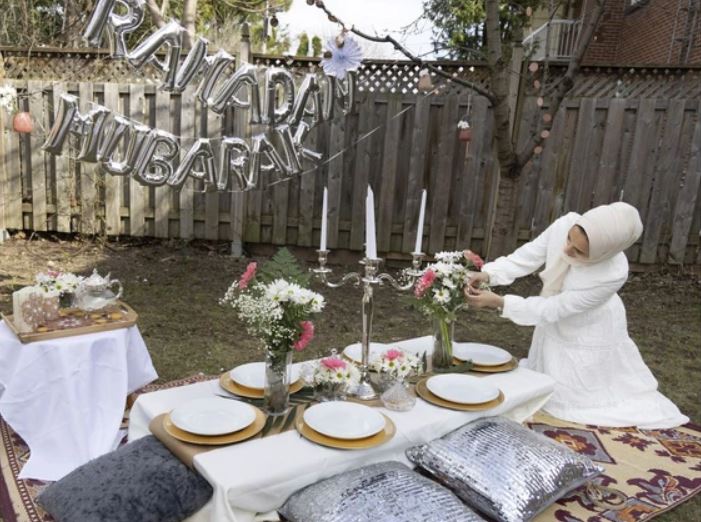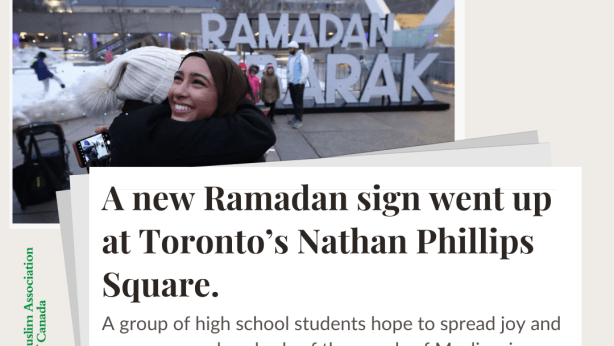Montreal Muslims forced to adapt again for Ramadan without social gatherings

Students from McGill will focus on outreach toward the most vulnerable members during Islam’s holiest month.
Doumouh Baltaji said Ramadan, which begins at sundown on Tuesday, has taken on new meaning in the last two years, but the message of the holiday has remained the same.
“It’s the month of sharing and of solidarity, and it’s a month of excellence,” said Baltaji, coordinator of volunteers for the Muslim Association of Canada.
Montreal Muslims forced to adapt again for Ramadan without social gatherings
It’s yet another challenging Ramadan for Montreal’s roughly 220,000 Muslims. With the pandemic raging in the province, any hopes of even small gatherings have been quashed by restrictions to prevent the spread of COVID-19. It’s the second year in a row that Muslims have had to adapt their celebration. Last year’s Ramadan began at the end of April — the height of the virus’s first wave.
“We were hoping Ramadan would have been a much better situation this year,” said Samer Majzoub, president of the Canadian Muslim Forum. “Another challenge is the curfew because most prayers are at night after the meals, so this is later than the curfew. We’re using mostly Zoom and doing some programs with virtual contact; it’s better than zero contact.”
Nabil Mirza, a spokesperson for the Ahmadiyya Muslim Jama’at community group in Montreal, said Ramadan during the pandemic is particularly difficult because of the important role that social gatherings play in Islam.
“In Islam, social gathering is very important: you gather five times a day in a mosque and you’re standing shoulder to shoulder,” he said. “That means we’re all equal, that no one is better than anyone else. We’re all in this together.”
Mirza urges Muslims to take time and organize their own virtual gatherings as a way to keep the community connected.
“Many people are feeling lonely during COVID, so virtual gatherings are a means of connecting with them and to make them feel they are not alone,” he said.
Since Muslims can’t gather, Baltaji has enlisted a group of 20 students from McGill and is focusing on outreach toward the most vulnerable members during Islam’s holiest month.
“We can’t celebrate with our close ones, but we can celebrate by offering food, and that will allow us to respect distancing measures,” Baltaji said. “Ramadan without helping and without sharing isn’t Ramadan. The idea is to be close to people who are suffering.”
On the first week, her group will offer roughly 50 meals to a food bank in the Bordeaux district of the Ahuntsic-Cartierville borough. The following week, they will give meals to single-parent families struggling to make ends meet. The group will also walk through the alleyways of downtown Montreal to offer food to homeless Montrealers.
During the holy month, Muslims only eat before sunrise and after sundown. While many Muslims will still observe the fasting period, the breaking of the fast, which traditionally consists of large family gatherings for feasts, will be mostly done through virtual gatherings.
Mosques and community centres are usually more full than ever during Ramadan because people gather to break the fast together and to pray afterward, but with restrictions of 25 people in places of worship, prayer, too, will be shifted online.
McGill law student Asiyah Siddique said Ramadan for her means helping the community at large, so she will be thinking about women suffering from conjugal violence and making donations to shelters as part of her Ramadan observance.
Siddique said the part of Ramadan she misses the most during the pandemic is her tradition of inviting those from outside the religion to take part in an Iftar, the meal breaking the fast after sunset.
“If this wasn’t COVID, we would have loved to host our non-Muslim peers,” she said. “When I was a CEGEP student, we had more than 200 students; we all cooked the food and broke bread together. It was amazing, and I really look forward to doing that in the future.”
Irfan Tahiri, co-president of the McGill Muslim Law Students’ Association, said there will be a virtual event for Muslim Law students at some point during the month. Tahiri has invited non-Muslims to fast or even to read up about Ramadan, saying people may be surprised to learn that there are benefits to fasting.
Siddique said Ramadan is also a time for non-Muslims to learn more about the religion, and show sensitivity.
“We love it when people ask us questions about Ramadan; there is no question that is a bad question,” she said. “If you want to wish us Happy Ramadan, it just makes our day when people recognize that we’re going through an important time of the year, as important as Christmas to Christians.”
To read original article click here


